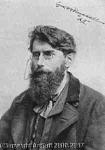George William Russell
George William Russell
Place: Lurgan
Born: 1867
Death: 1935
Biography:
George William Russell who wrote with the pseudonym Æ (sometimes written AE or A.E.), was an Irish writer, editor, critic, poet, painter and Irish nationalist. He was also a writer on mysticism, and a central figure in the group of devotees of theosophy which met in Dublin for many years.
Russell was born in Lurgan, County Armagh, (not as is often said in Portadown), second son of Thomas Russell and Mary Armstrong. His father, the son of a small farmer, became an employee of Thomas Bell and Co, a prosperous firm of linen drapers. The family relocated to Dublin, where his father had a new offer of employment, when George was eleven years old. The death of his much loved sister Mary, aged 18, was a blow from which it took him a long time to recover. He was educated at Rathmines School and the Metropolitan School of Art, where he began a lifelong, if sometimes contentious, friendship with William Butler Yeats. In the 1880s, Russell lived at the Theosophical Society lodge at 3, Upper Ely Place, sharing rooms with H. M. Magee, the brother of William Kirkpatrick Magee.
Russell started working as a draper's clerk, then for many years worked for the Irish Agricultural Organisation Society (IAOS), an agricultural co-operative society initiated by Horace Plunkett in 1894. In 1897 Plunkett needed an able organiser and W. B. Yeats suggested Russell, who became Assistant Secretary of the IAOS.
In 1898 he married Violet North; they had two surviving sons, Brian and Diarmuid, as well as a third son who died soon after birth. Frank O'Connor, who was a close friend of Russell's in his later years, remarked that his family life was something of a mystery even to those who knew him best: O'Connor noticed that he never spoke about his wife and seemed to be at odds with his sons (although O'Connor himself liked both of them). While his marriage was rumoured to be unhappy, all his friends agreed that Violet's death in 1932 was a great blow to Russell.
He was an able lieutenant to Plunkett, and travelled extensively throughout Ireland as a spokesman for the IAOS; he was mainly responsible for developing the credit societies and establishing Co-operative Banks in the south and west of the country, the numbers of which increased to 234 by 1910. Russell and Plunkett made a good team, with each gaining much from the association with the other. As an officer of the IAOS he could not express political opinions freely, but he made no secret of the fact that he considered himself a Nationalist. During the 1913 Dublin Lock-out he wrote an open letter to the Irish Times criticizing the attitude of the employers, then spoke on it in England and helped bring the crisis to an end.
As a pacifist, Russell could have no sympathy either with the aims of the Easter Rising or the undemocratic methods chosen to further it, but he was deeply moved by the deaths of the leading rebels, and like Yeats he celebrated their sacrifice in verse:
And yet my spirit rose in pride Refashioning in burnished gold The images of those who died Or were shut up in penal cell Here's to you Pearse, your dream, not mine And yet the thought- for this you fell Has turned life's water into wine.
from To the memory of some I knew who are dead and loved Ireland (1917)
He was an independent delegate to the 1917–18 Irish Convention in which he opposed John Redmond's compromise on Home Rule. He became involved in the anti-partition Irish Dominion League when Plunkett founded the body in 1919.
Russell was editor from 1905 to 1923 of the Irish Homestead, the journal of the IAOS. His gifts as a writer and publicist gained him a wide influence in the cause of agricultural co-operation. He then became editor of The Irish Statesman, the paper of the Irish Dominion League, which merged with the Irish Homestead, from 15 September 1923 until 12 April 1930. With the demise of this newspaper he was for the first time of his adult life without a job, and there were concerns that he could find himself in a state of poverty, as he had never earned very much money from his paintings or books. At one point his son Diarmuid was reduced to selling off early drafts of his father's works to raise money, rather to the annoyance of Russell, who accused Diarmuid, with whom his relations were not good, of "raiding the wastepaper baskets". Unbeknownst to him meetings and collections were organized and later that year at Plunkett House he was presented by Father T. Finlay with a cheque for £800. This enabled him to visit the United States the next year, where he was well received all over the country and his books sold in large numbers.
He used the pseudonym "AE", or more properly, "Æ". This derived from an earlier Æon signifying the lifelong quest of man, subsequently abbreviated.
His first book of poems, Homeward: Songs by the Way (1894), established him in what was known as the Irish Literary Revival, where Æ met the young James Joyce in 1902 and introduced him to other Irish literary figures, including William Butler Yeats. He appears as a character in the "Scylla and Charybdis" episode of Joyce's Ulysses, where he dismisses Stephen's theories on Shakespeare. Dedalus borrows money from him and then remarks: "A.E.I.O.U." His collected poems was published in 1913, with a second edition in 1926.
More...
Wikipedia link: Click Here














